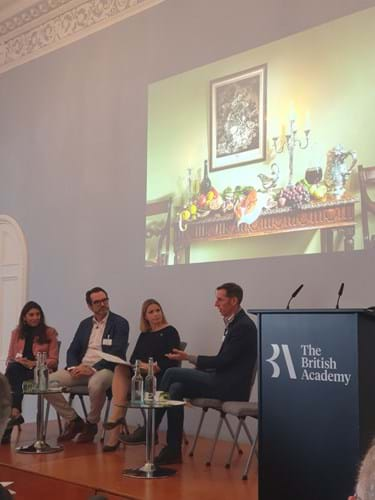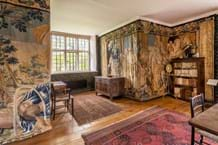
For many attendees, it was a first trip into the capital since before the coronavirus pandemic struck in March 2020.
Delegates gathered in a single room, mostly unmasked, chatting about the fairs (Basel, Battersea, Frieze etc) which have finally reopened physically. The scene was testament to loosening restrictions and a market returning to normal.
However, as speakers testified, the pandemic brought changes, from the dominance of the internet to the need to book a time slot when visiting a fair, that are here for the foreseeable future. But that’s not necessarily a bad thing.
Lesson one: Post-pandemic restrictions might work to dealers’ benefit
“Timed entry to fairs means you have the chance to talk to clients one-on-one,” said Harry Triggs of TM Lighting. “You can attend to clients in a more specific way.” He spok during the first panel session of the day Enhancing the Visitor Experience in Your Shop or Gallery.
Kim Field of 4D Design Agency added that people are more likely to attend an event when they have a timed invitation, making it more likely that desired clients will try to attend once they have booked.
“Now it won’t be so much about getting the big numbers to fairs, but about how visitors felt – and how much sold,” he said.
The restrictions on traditional events have meant that dealers have looked for new ways of doing business, and the panel unanimously urged collaboration to draw in new clients and to build brands. Combining different types of stock can be a way of reframing it – and provide subjects engaging social media content.
Lesson two: Trade associations are crucial in a landscape of new legislation
Craig Davies of Rawlinson & Hunter dubbed the past two years “a perfect storm” for the trade, bringing Brexit, the 5th Anti-Money Laundering Directive as well as the coronavirus pandemic. He was part of the discussion Cutting through the Red Tape: Brexit & AML, which addressed how dealers can make sense of and comply with new legislation. According to Ivan Macquisten, director of iMacQ (and former Editor of the Antiques Trade Gazette), it’s crucial to do so now as there are likely to be more laws as time goes on.
LAPADA has listed service providers and posted articles on the topics on its website. During the panel’s Q&A session, dealers made it clear that they were keen for more, asking for a checklist of questions to ask shippers to confirm compliance with AML as well as an info page to reassure new buyers that asking for identification when purchasing over a certain level is standard practice.
As LAPADA CEO Freya Simms agreed to these proposals, Macquisten said that there has never been a more important time to belong to a trade association.
Lesson three: Now is the time for digital courage
Most dealers turned to the internet in the face of coronavirus restrictions. With these easing, is it time to ease off on the online marketplace? Probably not, several speakers agreed. In his afternoon talk What Art & Antiques Businesses Can Learn from the Luxury Strategy Approach, Fabio Ciquera of London College of Contemporary Arts stressed that online channels will continue to accelerate in importance, as younger generations become key buyers of luxury products.
“Digital should be at the centre of the market,” he said, noting that while the luxury market has shrunk in the wake of Covid, the online luxury market has doubled.
In the following session The Evolution of Selling Art & Antiques Online, panellist Carmine Bruno of The Bruno Effect talked about marketing stock online as a first step to attracting new buyers from a worldwide marketplace.
Mark Hill of Ronati agreed, adding that using new technologies such as video calls doesn’t preclude good old-fashioned selling techniques. He encouraged dealers to share their passion via Zoom or WhatsApp as they would in person.
The LAPADA Conference was held at Carlton House Terrace in London on October 12.





